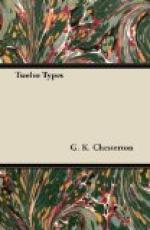‘Cyrano de Bergerac’ came to us as the new decoration of an old truth, that merriment was one of the world’s natural flowers, and not one of its exotics. The gigantesque levity, the flamboyant eloquence, the Rabelaisian puns and digressions were seen to be once more what they had been in Rabelais, the mere outbursts of a human sympathy and bravado as old and solid as the stars. The human spirit demanded wit as headlong and haughty as its will. All was expressed in the words of Cyrano at his highest moment of happiness. ‘Il me faut des geants.’ An essential aspect of this question of heroic comedy is the question of drama in rhyme. There is nothing that affords so easy a point of attack for the dramatic realist as the conduct of a play in verse. According to his canons, it is indeed absurd to represent a number of characters facing some terrible crisis in their lives by capping rhymes like a party playing ‘bouts rimes.’ In his eyes it must appear somewhat ridiculous that two enemies taunting each other with insupportable insults should obligingly provide each other with metrical spacing and neat and convenient rhymes. But the whole of this view rests finally upon the fact that few persons, if any, to-day understand what is meant by a poetical play. It is a singular thing that those poetical plays which are now written in England by the most advanced students of the drama follow exclusively the lines of Maeterlinck, and use verse and rhyme for the adornment of a profoundly tragic theme. But rhyme has a supreme appropriateness for the treatment of the higher comedy. The land of heroic comedy is, as it were, a paradise of lovers, in which it is not difficult to imagine that men could talk poetry all day long. It is far more conceivable that men’s speech should flower naturally into these harmonious forms, when they are filled with




